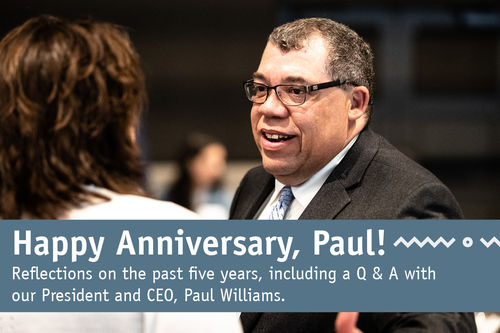What excites you most about your work?
I believe in the power of community and the importance of strong community institutions. PPL is not a business. PPL is a community-based organization; a platform for community voice. This has always been at the heart of what I'm passionate about: building strong community voice with an emphasis on dignity and pride. I want communities to be able to solve their own problems and stand up for themselves.
This is where I come from. I grew up in inner-city neighborhoods and communities. I have seen people systematically stripped of their dignity and wealth, their ability to make the most of their future. I have seen people struggle to have that sense of pride. That's why it's important to me. I truly believe the broader community will be stronger if people with the fewest resources are able to thrive.
How have community needs evolved in the last five years and how has PPL responded?
Homelessness is at its highest point in the last 10 years. There's also a workforce crisis - upwards of 140,000 jobs are open that can't be filled. As a result, we've doubled down on our strategy of building self-reliance through transformative housing development and career readiness. Racial equity work, our place-based work, and our belief in neighborhoods and community are key lenses throughout our Strategic Plan. We believe that this plan is relevant, timely, and remains at the top of the region's priorities.
What will it mean for our community when all households have achieved stability?
Stability leads to vitality. We will have a more economically healthy region. We will have a more competitive region relative to our peer cities across the country. It will save us money to not be spending more to house people in emergency rooms and on the streets and shelters rather than having them stabilized in permanent supportive housing. This translates into a stronger regional economy.
Our kids will do better in school, and our families will experience less trauma. Instability creates trauma and leads to poor outcomes. We'll have a more resilient and engaged community, where people can bring their best to the community because they're not dealing with a crisis.
In the last five years, workforce and housing shortages have continued to increase. How is PPL creating innovative solutions to combat these shortages?
On the employment side, we've grown our career readiness strategy around short-term, certificate-based training in areas where we see emerging career opportunities, like banking, healthcare, building operations, and government. We're pushing an employer-driven strategy where industry employers actually help to develop class curriculum so participants are best positioned to be hired.
We're also building our work around youth employment and creating a holistic approach to our work with kids in and out of school. We're working closely with country-involved youth and school districts to strength wraparound supports and provide workforce readiness curriculum so that students graduate and have a plan for what comes next.
In housing, we're continuing to build transit-oriented developments and piloting new strategies of building workforce housing that doesn't rely on government subsidies. Further, by partnering with service organizations like Youthlink, Ain Dah Yung Center, Simpson Housing, and others, and bringing our real estate expertise into those relationships, we're able to deliver critically needed affordable housing for our most economically challenged households.
What are the biggest challenges we continue to face in our work, and how is PPL positioned to overcome these challenges?
The existing model of putting together the support for a housing development project is a very tedious process, and immensely expensive. We're positioned well to figure out different ways of financing this work as we look at a variety of construction and efficiencies possibilities. Helping our legislative partners address systems change issues that are needed around zoning, density, and regulation must also be part of the answer.
Automation in the workplace continues, and what and how people will work continues to evolve. In our career readiness work, we're constantly reassessing, trying to match skill sets and training with what's needed in the employment marketplace. Folks in our communities need a job. They're ready to work. They need an income and they need the opportunity to move into a career.
What outcomes or initiatives are you most proud of since coming to PPL?
I've very proud of our internal racial equity work. The journey we've been on for the past five years has been very intentional and rewarding. It's been rewarding to see our staff diversity improve to upwards of 50% staff of color (up from about 30%), and our board to about 30% (up from about 16%), and to see close to 75% of staff engaged in the Intercultural Developmental Inventory (IDI) cultural competence assessment process. It's been a difficult journey, and one that we're still continuing on, but very rewarding.
I'm also proud of the fact that we decided not to do some things. We've focused our work. We've made difficult decisions to step back from some of the work we used to do. I'm proud of a lot of our staff and board for courageously helping us make those decisions. It has helped us focus on what we're best at, and progress more intentionally and strategically in our housing, employment training, and equity work.

